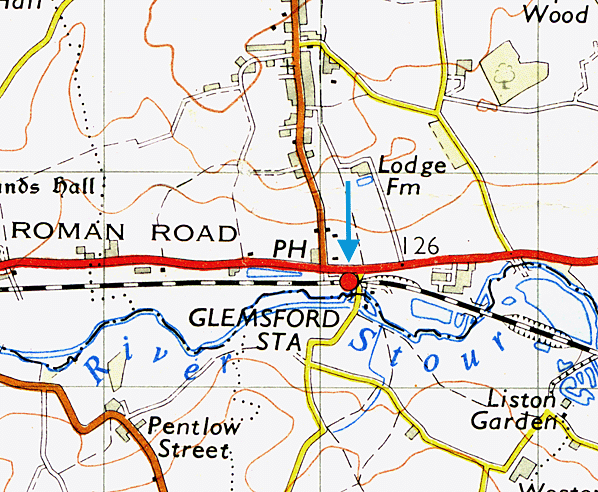|
Notes: The canopy from Glemsford now forms the canopy of the
replica building at Castle Hedingham Station on the Colne
Valley Railway
BRIEF HISTORY OF THE STOUR VALLEY
RAILWAY
In 1846 the Colchester, Stour Valley, Sudbury & Halstead Railway
was authorised by parliament to build a 12 mile line between Marks
Tey and Sudbury. On 1.6.1847 further Acts were obtained allowing
the company to extend from Sudbury to Clare with a branch from
Melford to Bury St. Edmunds. The company was leased to the Ipswich
& Bury St. Edmunds Railway which was in turn absorbed by the
Eastern Union Railway the following month.
The line from Marks Tey to Sudbury opened on 2.7.1849 and on
1.1.1854, the Eastern Counties Railway (ECR) took over the Eastern
Union Railway. In July 1860, the newly formed Sudbury & Clare
Railway Company revived the 1847 Act and by a new Act of July
1860 they were empowered to build a line from Sudbury to Clare
via Melford. However, as soon as the powers were obtained, the
ECR took over and immediately sought extended powers to build
from Sudbury to Shelford on the London-Cambridge main line, plus
a branch from Melford to Bury St. Edmunds. At the same time, the
Colne Valley Company, anxious to be independent from the ECR,
sought approval for a line to Cambridge.
A bitter struggle between the two companies ensued but the Colne
Valley Bill was rejected while the ECR received approval to go
ahead. However, further changes were imminent and in August 1862
an amalgamation of companies including the ECR came about and
the Great Eastern Railway (GER) came into being.
The Act renewed the authorisation for the proposed ECR lines
to proceed with the addition of a connecting line at Haverhill
between the Stour Valley and Colne Valley railways. The first
section between Shelford and Haverhill opened on 1.6.1865. The
remaining lines from Haverhill to Sudbury followed on 9.8.1865.
During the period prior to the First World War, the line saw
some of its best traffic with through trains between Cambridge
and Clacton via Sudbury. The war brought little reduction in traffic
but by the 1920's the familiar pattern of road competition was
setting in although rail traffic continued quite healthily for
some years; some economies were made but many excursion trains
continued to run.
When the Second World War came, the situation changed dramatically.
Passenger services were reduced although freight services remained
active. When the allied bomber offensive began, the lines assumed
new importance with airfields being established throughout the
area.
| After the war excursion trains
returned once again to Clacton and other seaside resorts.
Changes came when British Rail announced a modernisation programme.
From 1.1. 1959, steam was scrapped and replaced by diesel
Railbuses and Multiple Units. Although passenger traffic showed
some improvement, it was not enough to overcome the increasing
losses being incurred. In April 1965, the British Railways
Board gave notice of their intention to close the line from
Marks Tey to Cambridge with total closure planned for 31.12.1966.
The Minister of Transport refused permission to close the
Sudbury to Marks Tey section because of commuter needs and
planned development at Sudbury. |
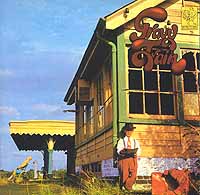 Glemsford Station appears on the cover of
the 1970 LP by Gravy
Train - click picture to enlarge
Glemsford Station appears on the cover of
the 1970 LP by Gravy
Train - click picture to enlarge |
After the war excursion trains returned once again to Clacton
and other seaside resorts. Changes came when British Rail announced
a modernisation programme. From 1.1. 1959, steam was scrapped
and replaced by diesel Railbuses and Multiple Units. Although
passenger traffic showed some improvement, it was not enough to
overcome the increasing losses being incurred.
In April 1965, the British Railways Board gave notice of their
intention to close the line from Marks Tey to Cambridge with total
closure planned for 31.12.1966. The Minister of Transport refused
permission to close the Sudbury to Marks Tey section because of
commuter needs and planned development at Sudbury.
The freight service was withdrawn from all the stations on the
Stour Valley line during the 1960's; the last station to lose
its freight service was Haverhill on 31.10.1966. Closure of the
Sudbury - Cambridge passenger service was delayed while local
councils considered providing annual subsidy; this was eventually
refused because of the high cost. The line from Sudbury to Shelford
closed entirely on 6.3.1967. In November 1969 the contract for
the removal of the permanent way was awarded to A. King and Sons
of Norwich and the track was lifted the following year.
The line to Sudbury survived several further attempts to close
it and after the 1974 energy crisis and the threat of petrol rationing
it was reprieved in the interests of the local community.
The Cambridge to Sudbury Rail Renewal Association was formed
in 1995 to campaign for the restoration of the rail service between
and Sudbury and Cambridge. A full feasibility study was commissioned
in 2003 which showed that 73.2% of people surveyed would use the
railway. It was then decided to form a limited company to present
a more professional approach.
The aim of the Cambridge
to Colchester Railway Development Company is to reopen the
line in two stages. Initially the line will be reinstated between
Cambridge and Haverhill with the remainder to follow at a later
date. It is intended that the new line should carry both passengers
and freight.
For further reading see: 'The
Stour Valley Railway' by B D J Walsh. Published 1978 by Stour
Valley Railway Preservation Society. ISBN 0 95064733 0 (£1.20
from Amazon)
To see the other
stations on the Stour Valley Railway line click on the station
name: Pampisford,
Linton,
Bartlow, Haverhill,
Sturmer, Stoke,
Clare, Cavendish,
Long Melford, Sudbury,
Bures & Chappel
& Wakes Colne
See also Colne
Valley Railway
Long Melford - Bury St.
Edmunds Branch Line
Bartlow - Audley
End Branch Line
|

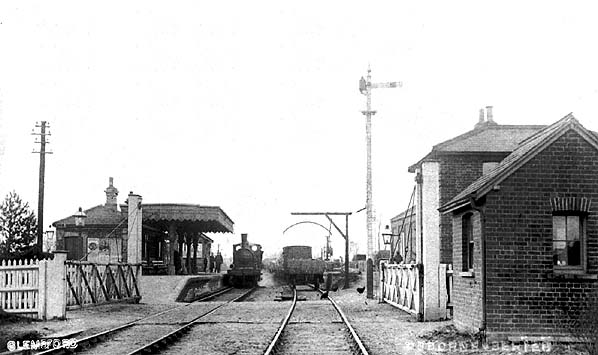
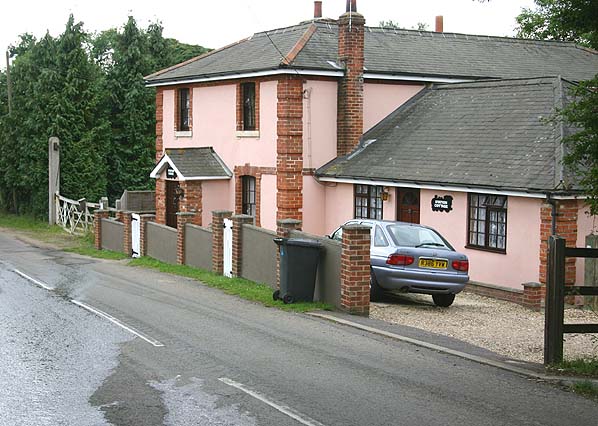
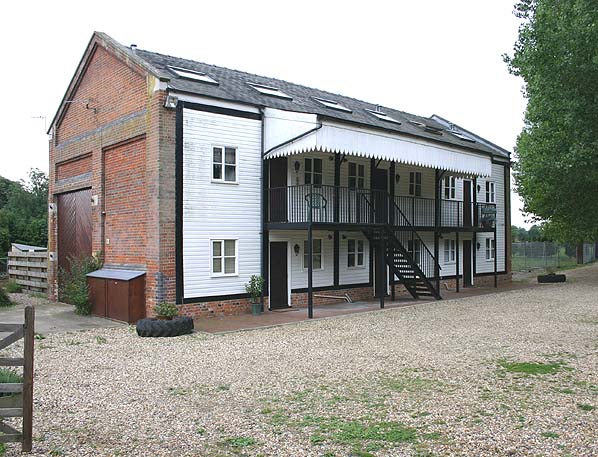
 Home
Page
Home
Page

